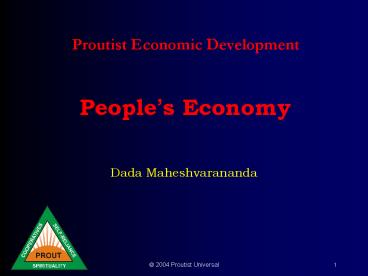Proutist Economic Development People - PowerPoint PPT Presentation
Title:
Proutist Economic Development People
Description:
Health care centres should be run as service cooperatives by the practitioners. ... in the constitution as fundamental human rights or as cardinal human rights. ... – PowerPoint PPT presentation
Number of Views:24
Avg rating:3.0/5.0
Title: Proutist Economic Development People
1
Proutist Economic Development Peoples Economy
- Dada Maheshvarananda
2
The Right to Live!
- The first priority of all Progressive Utilisation
is to ensure that every human being can live. - The minimum necessities of all should be
guaranteed in any particular age. P. R. Sarkar
The degree of justice in a society can be
evaluated by the way food is distributed amongst
all of the citizens. Frei Betto
3
Food Security in Venezuela
- CEREAL CONSUMPTION in 1999
- Total domestic production
- 2.16 million tonnes
- Total imports
- 2.16 million tonnes
- The country is producing only 50 of the cereals
it is consuming!
4
The Five Minimum Necessities
- Food (including pure drinking water)
- Clothing
- Housing
- Education
- Medical care
5
Supplementary Needs
- Sanitation
- Electricity
- Communication facilities
- Local transportation
- Irrigation water for farmers
6
The Right to Work
- Meaningful employment with fair wages is also a
fundamental human right. - A just minimum wage must be set high enough so
that people may purchase their necessities.
7
Minimum Necessities to be Progressively
Determined
- Continual adjustment of the basic requirements.
- Depending upon the available resources and
scientific standard of the locality. - The standard will change with time and place.
8
Economic Progress
- Economic progress increasing purchasing
capacity - Guaranteed availability of basic goods and
services - Stable prices
- Progressive and periodic wage increases
- Increasing collective wealth and productivity
9
Peoples Economy
- This field of economics concentrates on providing
goods and services to the people, including all
minimum necessities and essential needs. - Analyzes individuals in relation to the economy
as a whole, including - living standard
- purchasing capacity
- economic problems.
- Is concerned with matters such as production,
distribution, storage, marketing and pricing of
consumable goods.
10
Classification of Commodities
- People's economy deals with minimum requirements
and people's subsistence problems, so it must
take precedence over other parts of the economy. - Requires a federal government to classify all
commodities (goods and services) into three basic
categories - - essential
- - semi-essential
- - non-essential.
11
Essential Goods
- Needed to maintain an adequate standard of life
- clean water
- most foods
- most clothing
- housing materials
- textbooks and teaching media
- medicines and related equipment
- Cooperatives would produce and sell most
essential commodities. - Add
- sanitation
- electricity
- communications
12
Essential Services
- Need to provide the basic necessities
- water and sanitation infrastructure
- schools, colleges, universities and kindergartens
- hospitals (especially emergency and basic needs)
- electricity and energy infrastructure
- communications infrastructure, etc
- local public transportation
- railway system
- regulation of airspace for national airlines
13
Provision of Essential Goods
- Cooperative industries are the best means of
organizing people in an independent manner so
that they take collective responsibility for
their livelihood. - Best form of economic enterprise that has a
balanced adjustment between collective spirit and
individual rights. - Involves getting things done between free human
beings with - equal rights
- equal human prestige (and mutual respect)
- equal locus standi (eg legal standing) so that
everyone's welfare is considered.
14
Provision of Essential Services
- The local, state and federal government should be
responsible for providing and/or regulating the
basic infrastructure for these services through
autonomous bodies set up for that purpose. - They operate as key industries.
- Health care centres should be run as service
cooperatives by the practitioners. - Ongoing considereation needs to be given to
cooperatisation of key industries.
15
Semi-Essential andNon-Essential Commodities
- Semi-essential, eg
- some types of food, beverages and clothing
- household items of convenience
- books for leisure (but not textbooks)
- most electronic goods of convenience
- Non-essential
- any luxury goods
- As the economy of a region develops, the number
of different types of commodities in all three
categories will increase and vary.
16
Provision of Semi-Essential and Non-Essential
Commodities
- These can be provided by small private
enterprises. - Small private enterprises would produce luxury
goods and some semi-essential items. - But cooperatives are the best means of
productions and distribution. - Prout always favours cooperatives.
- Government in the Prout framework should
coordinate / regulate not be directly involved
with the production and distribution of goods
and services. - To ensure guarantee of basic minimum necessities
for all.
17
Peoples Economy and Human Rights
- When human rights become the basis for
structuring an economy, the result is peoples
economy. - Peoples economy will deal with the essential
needs of the people in general. - Including production, distribution, marketing,
shopping, storage, pricing, sales, freight
charges, standard costing all related
activities.
18
Constitutional Powers
- The necessity of people's economy is to be
reinforced by constitutional power. - Minimum requirements must be assured through
guaranteed purchasing power which should be
enshrined in the constitution as fundamental
human rights or as cardinal human rights. - This will give citizens of the country power to
sue a government if their minimum requirements
are not met.































